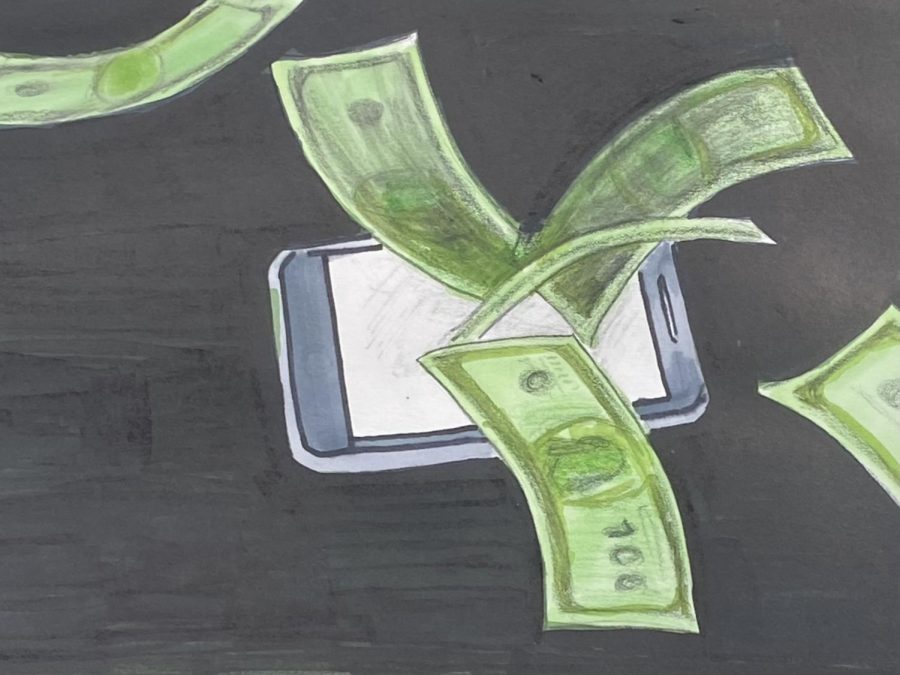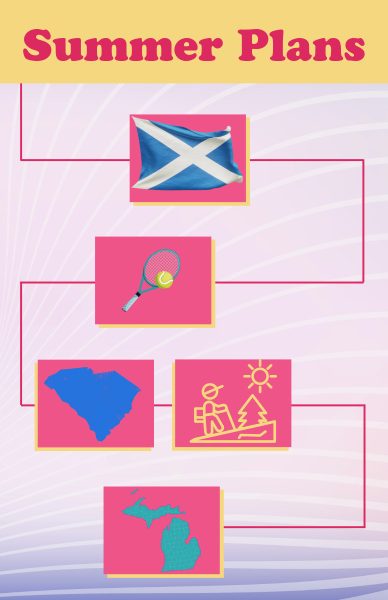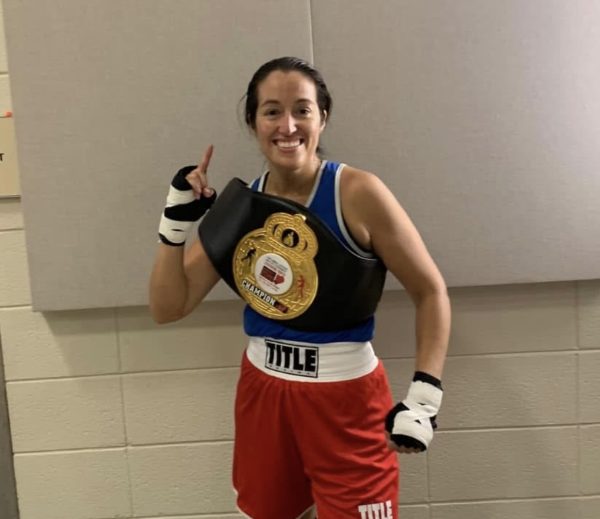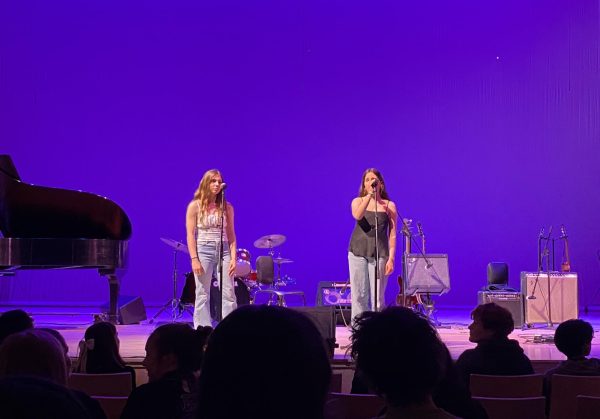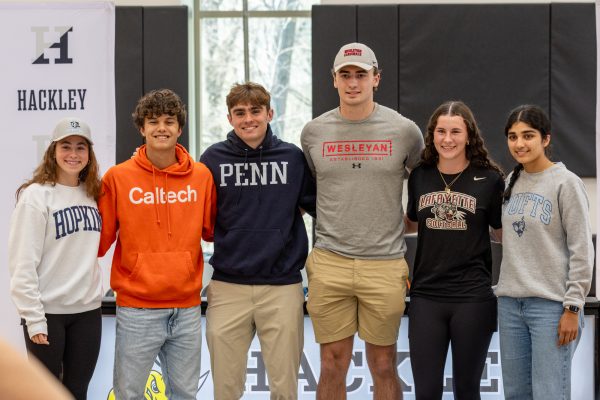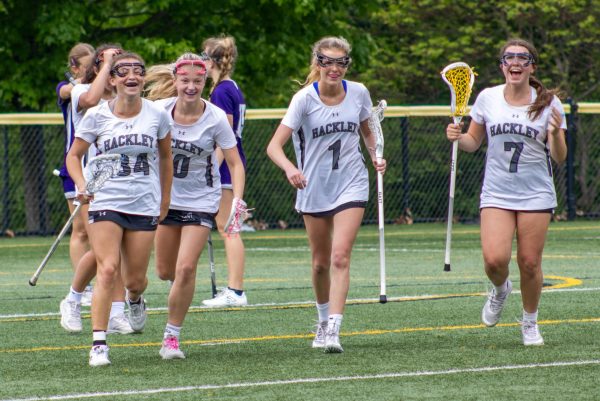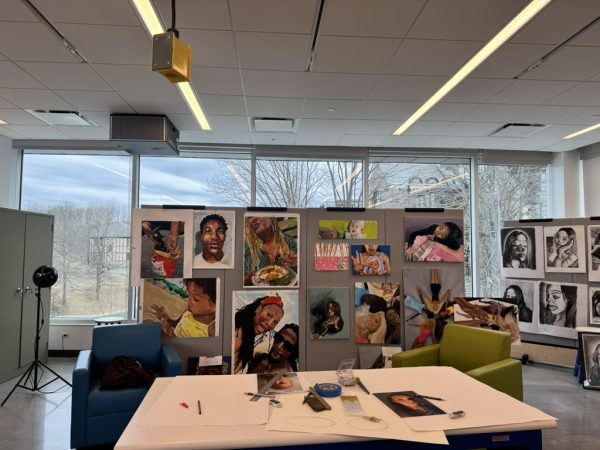Sports Gambling Surge Impacts Students
Credit: Lucia Butterfield
Sophomore artist Lucia Butterfield lent a helping hand in illustrating a drawing of how mobile betting platforms have affected her surrounding community. Lucia cited one of Hackley’s most commonly stated mottos as an example to follow to help others recover from sports gambling addictions,”Enter here to be and find a friend”.
“It genuinely worries me,” said Director of the Upper School Andy King regarding sports gambling at Hackley.
In early May of 2018, the doors to a 150-billion-dollar enterprise of previously illegal commercial sports betting were opened to the public in a Supreme Court decision that reversed the 1992 Professional and Amateur Sports Protection Act.
The Court’s ruling held that the 26-year-old act was unconstitutional and states that were serving as hubs for illegal gambling such as New Jersey and New York swept in and took advantage. Last year, 27 states took home a combined 1.5 billion dollars in revenue. Since the legalization, New York has raked in a whopping 826 million dollars in revenue (as of March 14th).
When somebody hears the word gambling, it is common to imagine a Las Vegas casino with bright lights. However, mobile sports betting apps including Caesars Sportsbook, BETMGM, Draft Kings, and FanDuel have become insanely popular, especially with underage illegal gamblers. According to the New York State Gambling Commission, in New York’s first year of legalized mobile sports betting, gamblers put a total of 16.7 billion dollars on the line. Legal Sports Reports estimated mobile sports betting is 80% of total gambling nationally.
As national sports gambling rates have skyrocketed, the number of underage sports gambling has as well. In a study by the UCONN Health Center, 60-80% of high school students have gambled in this past school year and 4-6% of students are addicted to gambling.
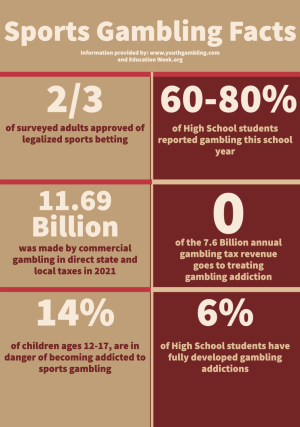
“Oliver” became aware of the possibility of sports gambling through advertisements on their TV and social media. (To protect the anonymity of Hackley students who fear disciplinary consequences they are being referred to by pseudonyms.)
Oliver’s interest in sports gambling stems from their love of sports and the possibility of a straightforward manner of making money.
”I have been deeply interested in sports for as long as I can remember,” they said, “If I’m not spending my money on clothes or video games, why not spend it on a subject that I really enjoy like sports.”
Their highest bet was around 20 dollars when their net total was up a lot. On average, Oliver’s bets tend to be around five dollars per bet. ”You definitely lose more bets than you win. However, if I lose five times but on the next bet I win big and double my money, my net profit goes up,” they said.
Ms. Pabst was very adamant about her distaste for the Supreme Court ruling, citing teenagers developing brains as a downside for ruling New York citizens over the age of 18 eligible to gamble. This idea brought up by Oliver is exactly what Ms. Pabst dislikes about the ruling,
“Adolescents feel risk is more rewarding than an adult, she said, “When a student wins on a bet, it feels more rewarding leading them to continue to do it. If a student loses the bet, they feel like you have to make up the money.”
The focus for Oliver is not to make money but to enjoy themself and have fun. ”I can watch teams that I didn’t like before or normally watch. Before, I would never watch a Charlotte Hornets game but if I bet on one of their players, that’s what makes me want to watch that game. It makes the games more exciting in its own way,” Oliver said.
Oliver was very open about their struggle to focus on schoolwork when a team or player in one of their bets was playing in a game. On the whole, Oliver thinks their mental health hasn’t changed: ”In the moment, I definitely feel extremely upset if I miss out on a big bet or extremely excited if I win a bet that would make me a major profit. Since I don’t have a job or taxes to pay as well as not betting such huge amounts that it takes over my life, it doesn’t stress me out to the point where it feels like life or death.”
In the beginning, Oliver recalls how sporadically they were betting and how it slowly crept up to an unhealthy amount. They talked about how hard they worked to get his average bet back into a more reasonable amount of money and their plans for what’s next.
”I think going into the future, I will continue sports betting but at a much slower and relaxed pace and amount,” they said.
Although Oliver’s circumstances display a kind of control over their situation, this may not last long and for most gamblers, it is not the norm. At Hackley, the majority of students are affluent and so losing money on a bet might not affect them as much as gamblers nationally. However, this addiction will still have a hold on them that takes priority in their mind over family, school, or athletics. Ms. Pabst’s insight shows how easy it is to latch on to an addiction and how difficult it is to break away from one. Gambling is a game of chance, if you continue losing bet after bet, not only will you lose money but your mental health and focus on other aspects of your life will deteriorate.
Senior basketball captain Isaiah Ndzibah confirmed the existence of sports gambling at Hackley.
“People gamble all the time on simple things, he said, “Betting five dollars on a Spikeball game isn’t that bad but I have seen people develop problems with sports betting and lose focus in class. I have seen people watch random horse races or overseas ping pong matches that they bet on during class time.”
He was not too distraught over the issue arguing that the issue only affects a minority of the school’s Upper School population, “There is probably only a handful of kids who are addicted to gambling and if these are the kids are trusted to drive cars, I believe they should be able to do whatever they want with their money.”
Ms.Pabst took the complete opposite stance when posed with the same question. In her role as the Department Chair of Health Education, Ms.Pabst stated that she has come across the issue at Hackley more often than she had in the past.
“More students now than five years ago are engaging in it,” she said, “Once you start doing it and winning, you begin chasing that high. I definitely have heard about it more recently.”
However, Isaiah did direct his concern and even frustration to the apps that don’t enforce age requirements.
“Mobile betting platforms are too easy to make an account, there isn’t a background check,” he said, “The majority of the responsibility lies with the companies who don’t make their sites more difficult for underage kids to access”.
Community Council Vice President EJ Regalado criticized the Supreme Court’s legalization of sports gambling for people over the age of 18. “It is a very irresponsible decision, she said, “These are students who are in college and still very young who have developing brains. It caused them to make impulsive decisions without thinking about the consequences.”
EJ echoed Isaiah, saying that only a small percentage of people were actually partaking in sports gambling. However, EJ mentioned that sports betting is a popular topic of conversion within the eleventh grade and it is starting to become more of an issue that administrators should be aware of.
This is an issue that has not passed over the Hilltop without harm as students across Hackley’s Upper School have been influenced by national trends. While Hackley’s administration has not discussed the increased number of students gambling via a public meeting or announcement, it has been on their radar.
“It’s not that the amount of gambling has taken us by surprise, but what we have to evaluate is if this something that we need to pay more attention to,” said Assistant Director of the Upper School Christopher Arnold.
Mr. King referenced Hackley’s policy on gambling, which states that gambling is prohibited at all times and that students are prohibited from using devices or networks for commercial or for-profit uses. He also made the point clear that he views this ongoing spread of sports gambling as a healthy decision-making issue versus a disciplinary matter.
“To some extent, it is a family matter as much as a school matter…I would treat a potential case like a family counseling matter as gambling is an addiction,” he said, “Just look at the small print on the betting advertisements.”
For Mr. King, it boils down to what you define gambling as. He brought up the ever-increasing number of students who participate in Fantasy Football leagues with buy-ins to be a participant and prizes for the winner.
“We’ve seen an explosion of interest in students with Fantasy Football. You come in on a Monday morning and walk through the hallways and it feels like every third cluster of people are talking about Fantasy Football. I don’t know to what extent this is the tip of the iceberg for students,” he said.
The next step for Mr. King to control the outbreak is figuring out, “What the what is.” He said that he does not know enough about the issue at the moment and has to talk to the students more. He also expressed concern about the limitations of his power and outreach as well as deans and other advisors.
“When whoever is giving an announcement in the Lindsay Room or Chapel to a group of students, one-third are listening, one-third are thinking to hell with you, and one-third don’t know what they are talking about,” he said.
“Gambling is when you place a wager on some event that will cost you in some way on some event that you don’t necessarily know the outcome of, often money but it could be a meal or push-ups as well,” said Assistant Director of the Upper School, Chris Arnold. He stated that the consequences could range from a family counseling meeting to a Board of Magistrates visit based on the severity of the particular case due to the assortment of actions that fall under the definition of gambling.
Mr. Arnold believes that places for more education are the key to solving the issue. “One of the issues is given the ease of access for sports gambling sites, is that we aren’t able to monitor it easily. I can catch a kid out of dress code but I don’t know whether the kid is texting or placing a bet on their phone.”
He described the inner dilemma that is cultivated in regard to if some betting should be permitted or if all of it should be illegal.
“My son goes to Skidmore University; they have world-famous horse races there every summer and putting a $5.00 bet down on a horse race is kind of fun. It is part of the atmosphere of the day but you also go and see people who are putting down enormous bets and who are clearly putting themselves in difficulty, so I have mixed feelings about the ease of access,” Arnold said.
The two believe that resources for students are the same as for other on-campus issues; Ms. Pabst, Upper School Counselor, Katya Ostor, the student’s dean, or advisor.
In Ms.Pabst’s eyes, New York isn’t viewing gambling with the right lens. Ms. Pabst believes that they should be looking at gambling more like substance abuse. Ms. Pabst believes that the age limit should be moved from 18 to 21. She is sentimental towards the ruling, however, due to the difficulty of regulating online platforms.
Ms. Pabst urged a warning to all of Hackley’s student-athletes to inform them of some not-well-known NCAA regulations: ”If you are playing a sport in college, no matter Division I or Division III, you are not permitted to bet on any college sport. As a collegiate athlete is it really worth that risk?”
Ms. Pabst stayed firm on her philosophy that has guided the Health program at Hackley of talking to students openly and honestly to understand the issue. Through these conversations, she wished to educate students about how a gambling addiction would impact their life-long goals. For sports fans, she mentioned her past work with college students who were addicted and how their view on watching sports games changed, ”It completely takes the joy out of watching the game. You no longer are rooting for the team you support but for the team, you bet on to cover the spread.”
As states continue to reap the benefits from tax revenue, children caught up in the problem continue to suffer. In a statement from Keith Whyte, the executive director of the National Council of Problem Gambling, he stated that his council’s findings provide evidence that the risk for gambling addiction has increased by nearly 30% from 2018 to 2021 for males ages 18-24. Furthermore, their research provided findings that show that the number of adults with gambling addictions is half the number of high schoolers with gambling addictions, and out of the 7.6 billion dollars annual federal gambling tax revenue, none of it goes to preventing gambling addiction.
For those who are losing hope for ending this prevalent issue, there still is a fighting chance. Last year, Virginia passed the first state law in the nation requiring education about the risks of gambling in public schools. Virginia delegate Sam Rasoul, who led the charge for the law backed up his decision proclaiming, “Children and young people are the fastest-growing segment of gamblers…This is a problem that needs to be addressed, it’s a great first step for Virginia.”
Many more states are pushing similar laws in their legislatures to help those recovering from gambling problems and prevention for potential addiction.
For anyone who needs support for their own struggles with gambling, Hackley’s counseling policy covers this matter meaning that there can be no repercussions toward your illegal activity if you reach out to help. Ms.Ostor is available to speak confidentially about one’s struggles and get help. On a broader level, the National Problem Gambling Helpline is (1-800-522-4700) which links the call to health organizations that can assist the caller. The website also offers guides to recovery free of charge.

